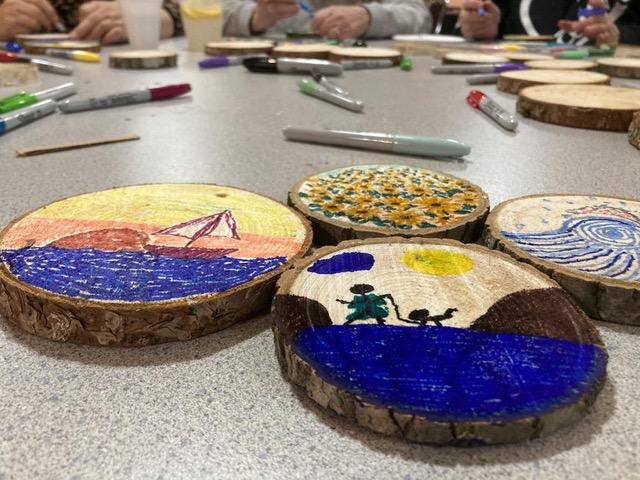
Welcome to the Childcare Desert
How local organizations (and three new centers) are addressing the childcare crisis
By Ross Boissoneau | Aug. 26, 2023
While it may be home to dozens of lakes, bays, and rivers, much of northern Michigan is a desert. No, not the kind with cacti and camels—a childcare desert.
Lest that sound overly dramatic, that is exactly how the situation is described by those in the industry. In fact, Michigan State University has created a Child Care Desert Chart and a Child Care Desert Map, which showcase how great the need is across the region and the rest of the state.
Though there is a need for childcare virtually everywhere Up North, it varies tremendously throughout the region. In Grand Traverse County, according to the aforementioned chart, there are 3.19 children for every slot at 0-3 years, 2.02 for preschool ages 3-5, and 3.85 for school-age children ages 6-11. For Leelanau, the figures are 5.55, 2.28, and 3.85, respectively. In Emmet, it’s 3.96, 1.81, and 6.06. In Wexford, it’s 8.19, 2.81, and 4.99.
It’s no surprise that for many areas, the greatest need is care for the youngest children, those who need the most attention.
“We focus on the zero to toddler; that’s the greatest need,” says Patricia Soutas-Little. A county commissioner, she is also a member of the Leelanau Early Childhood Development Commission (LECDC) and has been involved in working to establish more childcare options. The goal of the LECDC is to provide families with access to a high quality, comprehensive, accountable system of care and early childhood experiences for all children.
Norika Kida Betti, the Early Childhood System Coordinator for Child Caring Now in the five-county region, says high quality care is vital for children’s social, emotional, and cognitive development, especially in those infant and toddler years.
“The first years are so important,” she says. Child Caring Now is an initiative of the Great Start Collaborative of Traverse Bay. It brings together some 60 organizations, including financial institutions, schools, health departments, the United Way, Northwest Education Services, and the five-county networking organization 5 to One, all geared to provide childcare across the region.
Kida Betti says collecting pertinent data about childcare needs is a challenge. “The numbers are tricky. I reached out to colleagues in the five counties for the number of licenses for fiscal year 2023. There are 30 childcare licenses that closed, 52 that are active, and 27 in pre-licensing,” she says.
While those numbers are solid, she says the challenge lies in translating them to the number of children served. “Those are very difficult to get a lot of information from,” Kida Betti continues. “Licenses can vary from six to 100-plus kids.”
The Microcenter: Little Acorn Childcare
Among the newest childcare options is Little Acorn Childcare in Northport. Led by Amalie Kristiansen, the facility will be the first “micro-center” providing childcare in Michigan. The concept combines elements of home-based and center-based childcare. It was developed by the Infant & Toddler Childcare Startup, a work group formed by the LECDC.
“Microcenters require variances,” says Soutas-Little. The idea stems from taking the concept of home childcare providers out of the home and into a facility. Soutas-Little says it’s basically a private/public partnership. When a previous agreement at Suttons Bay Schools was unable to proceed due to construction, they looked at Northport.
“It’s so hard to find care for children under 30 months,” says Kristiansen. “We started last August and spent a year getting the license and the facility ready. The need has been growing since COVID.” She adds that the pandemic shut down some of the home-based childcare programs in the county.
Partners in the program include the Village of Northport (funding the center), the Leelanau Peninsula Economic Foundation, the Leelanau Children’s Center, and numerous volunteers. Capacity will be 12 once the facility is fully staffed.
And speaking of staff, as with virtually all childcare options, financing is a huge challenge. Balancing a living wage for providers with maintaining a reasonable cost for families is always difficult. Add the cost of refurbishing a home or building and the cost of inspections and licensing, and it becomes too much for many.
Soutas-Little says a grant of $318,000 from the Early Childhood Investment Corporation (ECIC), a private nonprofit corporation, has been key to its plans to increase the number of quality childcare businesses in Leelanau County. The goal with the grant is to open a total of six centers, two home-based and four home-scaled hybrids. Northport is the first to open.
For Kristiansen, running the center is a full-circle moment. “It’s where the Leelanau Children’s Center used to be, and my husband and I went here as kids.”
The Regional Center: Pitter Patter Preschool and Childcare
Pitter Patter has three locations, two in Kingsley and one in Interlochen, all named for forest animals. It serves children from six weeks to 12 years at the Kits location in Kingsley, 30 months until 12 years at the Fawns location in Kingsley, and six weeks to 12 years at the Hatchlings location in Interlochen. Kits is licensed for 28 students, Fawns for 41, and Hatchlings for 60.
Pitter Patter was established in November 2018, though the Interlochen location opened just last year. The business partners with other programs and educational institutions, including Early Head Start, Head Start, and the Father Fred Foundation.
“We work with Kingsley Elementary and Silver Lake Elementary to provide before- and after-school care and do a full summer camp for school age children as well,” says Regional Director Michelle Stark, who has more than 20 years experience in the field.
Pitter Patter also partners with the ACD Food Program, which represents the Child and Adult Care Food Program, through the United States Department of Agriculture to provide healthy and nutritious meals and snacks at no cost to families, and with the Grand Traverse Baby Pantry to provide supplies to Early Head Start families throughout the school year.
Stark says seeing the children develop through the year is richly rewarding. “It’s all the little things,” she says. “The team is so committed to the children. They make a difference.”
The Family Center: Northern Blooms Montessori
One of the more intriguing concepts to enter the scene in the last few months, Northern Blooms Montessori is part of the Commongrounds coop in Traverse City and is housed at the facility on Eighth Street. Enrollment applications for the fall 2023 are now open, with classes beginning in mid-September.
Kate Redman, project director and co-founder of Commongrounds, says the concept of an on-site childcare program was always part of the foundation of the idea of Commongrounds, which also includes residential units, the performance space The Alluvion, a teaching and commercial kitchen, and the collaborative cafe, bar, and restaurant Nobo Mrkt.
One of the unique facets of the program is that families qualifying for TriShare or the upcoming DuoShare receive preference for up to two-thirds of the openings. TriShare is a program where parents, their employers, and the state of Michigan each pay one-third of the cost of childcare. The pilot program is coordinated in this region by United Way of Northwest Michigan. Employers must enroll in the program for employees (parents) to be eligible.
“We spent two years trying to get it off the ground,” says Pam Amundsen, Northern Blooms board president. She says there will be six employees, and as of this writing, the organization was still in the hiring process.
Amundsen knows firsthand the challenges of finding childcare. “I have a toddler, and I know there are a lot of people with kids. We wanted an infant room, and the math just didn’t work. It’s really expensive.” The slots that are open will serve those from 2½ to 4 years of age.
She says the facility also has a geographic focus, providing a potential childcare option for those who live or work at Commongrounds or nearby. “It plays into the broader conversation of walkable communities,” she says.
Moving Forward
Even with these and other programs opening and offering various options, much of the region remains identified as a childcare desert. And even when parents are able to find caregivers, it may require them traveling great distances.
While working to address the need, those in the field admit it is a challenge. “There are not enough slots,” says Soutas-Little.
Kida Betti says it is important to not only provide financial support for those in or entering the field, but to also recognize how significant it is. “Something everyone can do is support and elevate our early educators. It’s such an important and difficult job. It’s a really important position, though sometimes it’s not seen that way,” she says.
Better yet, roll up your sleeves and help out. Those who have an interest don’t have to take on a full-time job. “There are opportunities to volunteer, and if you don’t want to do full-time, be a substitute,” Kida Betti adds.
Trending

Walking in an Artsy Wonderland
Michigan Legacy Art Park is hosting the “Raindrops” artwork created by Dewey Blocksma and Patricia Innis at th... Read More >>
Seven Takeaways from Local Real Estate Agents for the Spring/Summer Market
The last few years in local real estate have been akin to what one local agent described as the “wild west,” w... Read More >>
Blazing the Boyne City to Charlevoix Trail
We’re getting ever closer to an interconnected northern Michigan thanks to ongoing work on the Boyne City to Charlev... Read More >>


